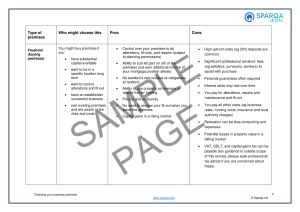 When choosing whether to rent, buy or take a licence for business premises, you’ll need to consider your budget and how much long-term security or flexibility you need. Renting or taking a licence to occupy your premises is cheaper and gives you more flexibility than buying premises, but you’ll have less long-term security. Taking on a fixed-term lease can provide some longer-term security. You should also check whether your tenancy counts as a ‘protected tenancy’, which gives you greater tenancy rights.
When choosing whether to rent, buy or take a licence for business premises, you’ll need to consider your budget and how much long-term security or flexibility you need. Renting or taking a licence to occupy your premises is cheaper and gives you more flexibility than buying premises, but you’ll have less long-term security. Taking on a fixed-term lease can provide some longer-term security. You should also check whether your tenancy counts as a ‘protected tenancy’, which gives you greater tenancy rights.
This blog will help you to choose what type of business tenancy might suit you best, and provide some tips on how to negotiate your tenancy agreement if you choose to rent premises.
You can use our guides on Choosing your business premises and Choosing between protected and unprotected tenancies for handy summaries of how to choose the type of business premises that best suits you, and a comparison of your main rights and responsibilities under protected and unprotected tenancies.
Choosing premises for long-term security versus flexibility
What sort of premises are best for long-term security?
If you need long-term security from your business premises, consider a fixed-term tenancy or buying premises. As a general rule, the more security you want, the more it will cost you. If you will be renting, note that there are different types of tenancies which offer more or less security, so it is important to look into the detail of any agreement with a prospective landlord to ensure that it will meet the needs of your business. See below for further guidance on different types of rental tenancies.
What sort of premises will offer the most flexibility?
If you want flexibility from your business premises (eg if you want to be able to move premises quickly or because your business is a start-up with rapidly changing requirements), a licence or a short-term or periodic tenancy are likely to be your best options. Licences are the most flexible option (eg for the use of an area within a co-working space or a suite in a block of serviced offices). Tenancies give you more security as they are generally harder to terminate (both for you and your landlord), and will give you full control over whatever premises you rent.
Alternatively, consider whether a longer fixed-term tenancy might suit you if it contains a break clause to give you the option to end it early if you need to. For example, you might be able to negotiate the inclusion of a break clause allowing you to leave after two years of a 10 year tenancy. Be very careful if relying on a break clause, as they can be tricky to invoke correctly. You can end up stuck paying for premises that you no longer want (see Tenant ending a tenancy for guidance on how to use a break clause).
You can find an overview of the key pros and cons of tenancies, licences and premises ownership at Choosing your business premises.
Renting business premises
What are the benefits of renting business premises?
Renting business premises can provide you with a reasonably secure alternative to buying them, in a fraction of the time and usually at a much lower cost. It will be easier and quicker for you to relocate (eg if you outgrow your current premises) than if you own the premises and need to sell in order to release your capital. This will ultimately provide you with greater flexibility.
Equally, you can negotiate with your prospective landlord as to your responsibilities for maintenance and repair. Your obligations will depend on the terms of your business tenancy, but, if you are renting a unit in a larger building, or a whole building for a very short time, it’s normal for your landlord to retain overall responsibility for maintaining the structure. Bear in mind, however, that you won’t have as much flexibility or control over making alterations to the premises as if you have bought them. You’ll need to carefully check the terms of your tenancy agreement to ensure that you are able to make any alterations that will be vital to your business. If you know that the business premises you intend to rent will require some alterations before you can use them, you can ask for a rent-free period from your landlord to cover the time you need to carry them out and settle in afterwards.
What types of rental tenancy are there?
There are three main types of tenancy:
- a fixed-term business tenancy;
- a periodic business tenancy; and
- a protected business tenancy, which can be for a fixed term or periodic.
What is a fixed-term business tenancy?
A fixed-term tenancy is one which runs for a set period of time before ending.
What is a periodic business tenancy?
A periodic tenancy is one which is for a particular length of time which repeats on a rolling basis (eg quarterly). It automatically continues in this way until either you or the landlord give notice for it to end . It gives you more immediate flexibility to leave the business premises than you would have if you took out a long fixed-term business tenancy or purchased your business premises.
What is a protected business tenancy?
This is a type of business tenancy which gives you the right to stay in the premises after it ends and request a new tenancy, whilst limiting the grounds on which the landlord can object. It is also sometimes referred to as a ’54 Act tenancy. See Choosing between protected and unprotected tenancies for a comparison of your main rights and responsibilities under protected and unprotected tenancies.
Most tenancies of business premises will qualify as protected business tenancies. If your tenancy is not a protected business tenancy, you can still renew it by agreement with your landlord, but they will have much more freedom to refuse or significantly change the terms of your tenancy agreement for the renewal. See Renewing or extending any business tenancy for how to go about the renewal process.
Under a tenancy can my landlord come into my premises whenever they want?
No. The tenant is the only one who is entitled to come and go as they please from the business premises.
However, your tenancy agreement will almost certainly give your landlord the right to come into your premises by prior arrangement with you, for example to carry out maintenance checks. A requirement to give reasonable notice (or sometimes 24 to 48 hours’ notice) is standard.
What running costs will I have to pay for rented business premises?
Check your tenancy agreement for exactly what you have to pay for. Some running costs may be rolled up into a service charge due to your landlord. This is common if you take out a business tenancy of a multi-occupied building. What you will have to pay and the services you receive in return will depend on the wording of your service charge clause. See What a service charge covers for guidance.
You are likely only to be responsible for repairing and maintaining the interior of the premises (unless you are renting the whole building).
Your landlord is legally obliged to provide you with an Energy Performance Certificate (EPC) before you rent the premises, which can help to give you an indication of what some of these costs might be. The EPC will provide information about the premises’ energy usage and typical energy costs, along with recommendations about how to reduce these costs.
How can I negotiate rent?
Check the rent clauses in the tenancy agreement to ensure that you understand how and when your rent will be payable. If you run a retail or restaurant type business, you may be charged turnover rent in addition to your base rent (ie rent assessed usually as a percentage of your gross turnover).
When negotiating rent, it can help to carry out a survey of the premises to establish the extent of any disrepair or defects. If you know that the premises will require some alterations before you can use them, ask for a rent-free period from your landlord to cover the time you need to carry them out and settle in afterwards. You can use the rent saved to offset the cost of the works. This is standard commercial practice, although your negotiating position and the length of rent-free period you can secure will be heavily dependent on the state of the property and the strength of the rental market at the time.
If your tenancy is over three to five years, the agreement will generally include provisions for a rent increase (eg either a set rent increase or a rent review). Rent reviews are typically on an upwards only basis, but you may want to try to negotiate the right to end the tenancy after a rent review (or a cap on how much rent can rise) in case it is put up too much.
Do I have to pay stamp duty on rented business premises?
Normally, only if your rent totals more than £150,000 over the fixed length of your tenancy. This means tenancies with a high rent or those over a long period are more likely to attract SDLT. HMRC has a helpful SDLT calculator. Full guidance about your tax obligations when leasing a property is outside the scope of this service.
Licences to occupy business premises
What is a licence (of business premises)?
A licence gives you permission to use the premises (or an area within larger premises). It gives you far fewer rights and less control over the premises than a tenancy, but is generally much more flexible, allowing you (or your landlord) to end the licence at fairly short notice and with little formality.
Can my landlord come in whenever they want if I only have a licence to occupy?
Yes, it is highly likely that your landlord will have the right to access your business premises at any time if you only have a licence to occupy.
Can I be forced to move to different premises if I only have a licence to occupy?
Yes, it is highly likely that your landlord will have the right to relocate you to other premises if they wish to. You will generally have much less security and control if you take premises under a licence rather than a tenancy agreement.
Can I renew my licence to occupy when it expires?
No, unless your licence agreement says so, you will have no right to renew it unlike with some types of tenancy. Your landlord is likely to have a right to end the licence at fairly short notice (the licence agreement will usually say how much notice must be given to you).
The content in this article is up to date at the date of publishing. The information provided is intended only for information purposes, and is not for the purpose of providing legal advice. Sparqa Legal’s Terms of Use apply.

Marion joined Sparqa Legal as a Senior Legal Editor in 2018. She previously worked as a corporate/commercial lawyer for five years at one of New Zealand’s leading law firms, Kensington Swan (now Dentons Kensington Swan), and as an in-house legal consultant for a UK tech company. Marion regularly writes for Sparqa’s blog, contributing across its commercial, IP and health and safety law content.






